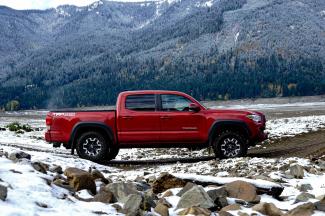
Too Much Truck, House Pinch Retirement Savings
I was intrigued this week when a story in my newsfeed headlined, “Americans’ love affair with pickup trucks might be derailing their retirement plans” popped up.
My husband has almost always had a truck. The one time we were in between trucks, he built a box to put in the back of our old minivan to haul dirt, stone or whatever else he felt we needed. He works at Cummins and, in the early days, helped design the Ram pickup truck engine.
While he no longer works on that engine, he’s proud of the engine’s capabilities. I am very fortunate that my husband is a practical man and appreciates the tradeoffs of buying a used truck that meets his needs versus buying a new Dodge Ram with a Cummins diesel. While the Dodge Ram is a good truck, it is way more truck than he needs, which makes it hard for him to justify a new truck. Much to my chagrin, he will drive that old truck until it rusts out or becomes mechanically unsound.
Transportation and housing are two areas where Americans tend to overspend to the detriment of long-term retirement savings. I remember taking a personal finance class where the professor said you should only need a car payment for your first car.
Make car payments over 36 months, continue to save the car payment money in a separate account each month, taking out only what you need for repairs as they pop up until no longer feasible. When you look for your next used car, you will know what your budget is.
Keep putting the same amount of money into a car fund and repeat. If you need to borrow, you are buying too much car. The thrill of a new car wears off long before the payments do.
Studies have also shown that you might experience an initial burst of happiness, but that dissipates over time and it just becomes another thing unless used for special occasions. I have a widowed client who treated herself to a convertible and loves the sunny days when she can take it for a spin. It’s not her everyday car. It’s her special-occasion car and, as such, she takes great delight in her various excursions.
The other area where we tend to overspend is on housing. The question I will ask clients is, “Do you own your house or does your house own you?” In other words, are you tied to a high- paying job in order to make mortgage payments? There are calculators that determine how much house you can afford, but that doesn’t mean you have to spend that much. A house is also not an investment; it is a lifestyle choice. It might appreciate and that is a bonus, but don’t count on it.
I have clients who plan to downsize in retirement. What they find is that they might purchase a smaller house, but it generally costs the same amount if not more than what their old house was worth. I have had a few clients manage to move into less expensive housing. One sold a farm and moved into town. The other sold a large lakefront home and bought a much smaller lakefront condo. I also remember the conversation with a couple looking at building a bigger house so they would have room for the grandchildren even though they were not on track for retirement.
The pandemic has highlighted the fragility of many Americans’ financial situations. We need to start prioritizing saving and self-reliance. Be realistic about what you can buy and how much you need to save for emergencies and also for when the time comes where you will no longer be able to generate an income from your labor.


